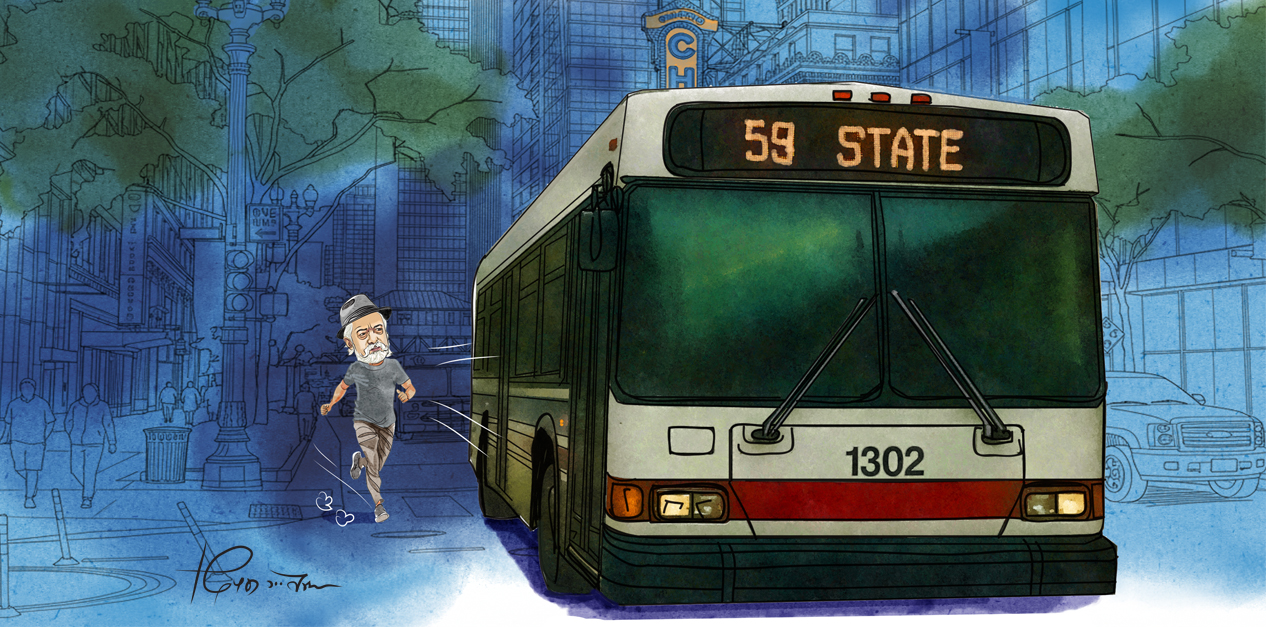
While sitting in the lounge and watching the scenes outside, a whirlwind of thoughts ran through my mind: “Who was the God I met in Chicago? Rahi, Kiran, the stranger, the Mexican girl, Whitney, the double-decker driver, the taxi driver—or someone else?”

The very first American city name I ever heard was Chicago. People usually talk about New York, Tokyo, or London, but once upon a time Chicago was no less renowned. In the 1950s, Chicago ranked eighth among the world’s most famous cities. The world’s first skyscraper was built there; it is also the birthplace of electric blues.
I was traveling from Dallas, near the southern end of the U.S., to La Crosse in the north, by train. After reaching Chicago’s Union Station, I had a few hours of transit. My friend Palpasa Kiran lived in Chicago with her sons Rahi, Ruben, and Sabin. She was like family to me, so I had informed her that I was coming. She came with Rahi, and we spent some time in a restaurant, chatting. Before parting, Rahi invited me to come and stay for a few days in the future.
Everyone must return to where they belong. Climbers must descend after their ascent. After about six months, I too was returning from Red Wing, via Chicago, to Dallas. I had called Palpasa and Rahi beforehand, but couldn’t reach them, so I booked a hotel. My train to Dallas was scheduled for 3 PM the next day. When I arrived at Union Station around noon, I sat in the huge waiting hall, trying to contact Rahi, hoping he would guide me to the hotel.
While waiting, someone suddenly said “Excuse me” and sat beside me. He introduced himself and quickly tried to become intimate in a way that seemed too fast.
He mentioned the film The Untouchables (starring Robert De Niro and Kevin Costner), which I had seen and loved. Pointing to a long staircase in the station, he said, “That’s where the unforgettable gunfight scene was filmed—the baby carriage tumbling down was shot right there.”
Sometimes, even unwanted information is delightful. I listened closely. Soon he figured out I was waiting for someone, and even learned I had booked a hotel. He then said, “My sister has space; you can stay there for free—just pay for food. Tomorrow you can go straight to the station.”
I’m not someone who easily says no, but a spark of suspicion flared inside me. I replied carefully, “Let’s see—if the person I’m waiting for doesn’t come, I’ll think about it.”
His eagerness and sudden familiarity made me uneasy. My mind spun out contingency plans. Finally, I asked him if there was food nearby. He said no. “Then I’ll grab something to eat,” I said, preparing to wheel my suitcase.
“Why take your luggage? I’ll watch it for you,” he offered.
I ignored him and left with my suitcase. His insistence added to my suspicion—Americans rarely concern themselves with strangers’ belongings.
Inside a restaurant, I spotted a young man and woman who looked like Newars. Relieved, I asked the woman in Newari if there was an exit toward the east. She replied in a strange tongue. Only then I realized she was Mexican, not Newar. I repeated the question in English, and she pointed northeast. As I turned, I saw the stranger watching me, smiling as if to reassure me, but clearly checking on me.
That confirmed my suspicion. I quickly exited toward the street, grabbed a taxi, and soon reached my hotel safely.
The next day, after checkout, I went to Hilton Hotel, where a booth sold tickets for a two-hour double-decker sightseeing bus. I bought a $25 ticket from an African-American girl named Whitney. She was warm and friendly.
On the tour, Lake Michigan spread out like an ocean on my right. When the bus stopped at Navy Pier, I stepped off for a cigarette. Remembering Mitch Albom’s novel The Five People You Meet in Heaven, I wandered, only to discover the bus had left—with my suitcase still on board.
I panicked, ran after the bus, shouted “Stop!”, but it didn’t. Finally, after false hopes and futile sprints, I realized it was gone.
Dejected, I hailed a taxi to Hilton. At the booth, Whitney was shocked to see me. She phoned the driver, who confirmed my luggage was safe. She reassured me: “The bus will be back in two hours.” I bought her favorite brand of cigarettes as thanks. When the bus returned, my luggage was intact. The driver joked, “Here’s your boyfriend’s bag.” I parted warmly with Whitney.
Later, I caught my train just in time. Settling into the lounge, gazing out the window, I pondered: “Who was the God I met in Chicago—Rahi, Kiran, the stranger, the Mexican girl, Whitney, the double-decker driver, the taxi driver, or someone else?”
The answer came rushing in: Not just in Chicago, but everyone I meet feels like God. Even those who seem to harm me ultimately save me. This is not just a belief—it is my conviction.